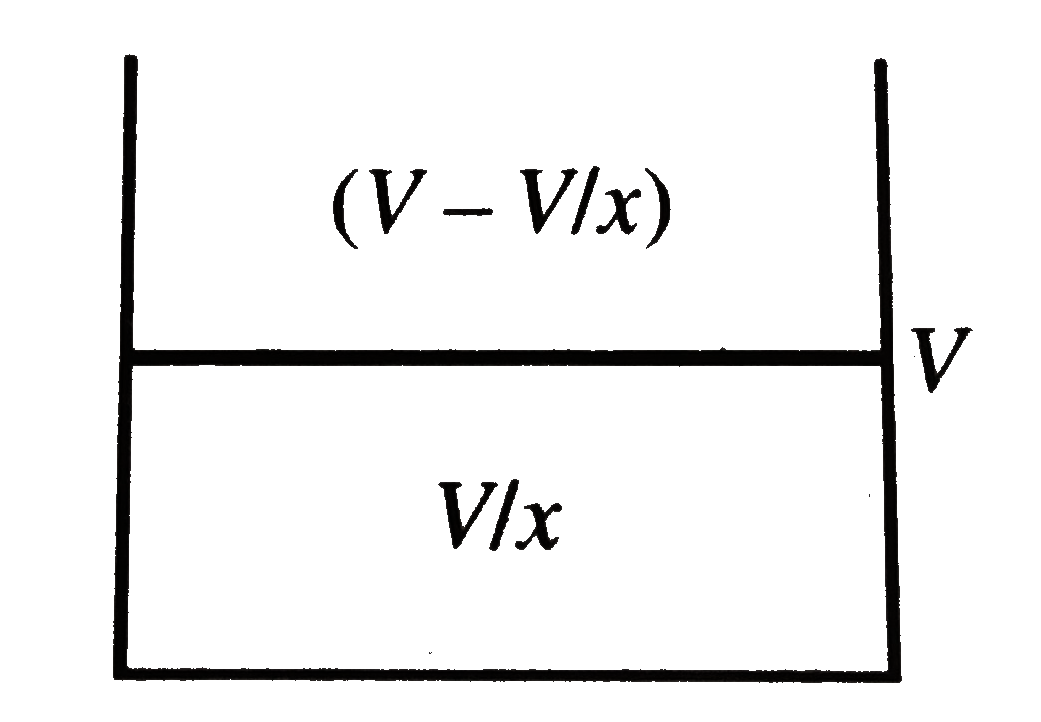The remaining volume of a glass vessel is constant at all temperature if 1x of its volume is filled with mercury. The coefficient of volume expansion of mercury is 7 times that of glass. The value of x should be
5
7
6
8
The correct Answer is:B

Let temperature is increased by ΔT.
Vg−VHg=V−Vx at all temperature
V[1+γgΔT]−Vx[1+γHgΔT]=V−Vx
⇒γg=γHgx⇒γg=7γgx⇒x=7
Topper's Solved these Questions
- BOOK - CENGAGE PHYSICSCHAPTER - CALORIMETRYEXERCISE - Multiple Correct25videos
CALORIMETRY
- BOOK - CENGAGE PHYSICSCHAPTER - CALORIMETRYEXERCISE - Comprehension30videos
CALORIMETRY
- BOOK - CENGAGE PHYSICSCHAPTER - CALORIMETRYEXERCISE - Subjective25videos
CALORIMETRY
- BOOK - CENGAGE PHYSICSCHAPTER - BASIC MATHEMATICSEXERCISE - Exercise 2.620videos
BASIC MATHEMATICS
- BOOK - CENGAGE PHYSICSCHAPTER - CENTRE OF MASSEXERCISE - INTEGER_TYPE1videos
CENTRE OF MASS
Similar Questions
Knowledge Check
- Question 1 - Select One
A one litre flask contains certain quantity of mercury. If the volume of air inside the flask remains the same at all temperatures then the volume of mercury in the flask is (volume expansion coefficient of mercury is 20 times that of flask)
A100ccB50ccC200ccD150cc - Question 2 - Select One
A weight thermometer contains 51g of mercury at 200C and 50g of mercury at 1000C. The coefficient of apparent expansion of mercury in glass vessel is
A25×10−5/0CB2.5×10−3/0CC2×10−5/0CD4×10−4/0C - Question 3 - Select One
When a block of iron in mercury at 0∘C, fraction K1of its volume is submerged, while at the temperature 60∘C, a fraction K2 is seen to be submerged. If the coefficient of volume expansion of iron is γFe and that of mercury is γHg, then the ratio (K1)/(K2) can be expressed as
A1+(60γFe)1+(60γhg)B1−(60γFe)1+(60γHg)C1+(60γFe)1−(60γHg)D1+(60γHg)1+(60γFe)
A flask of one liter volume contains some mercury . It is found that volume of air inside , the flask remains constant at all temperatures .If 'a' of glass is 9×10−6 SI units ,coefficient of real expansion of mercury is 180×10−6 SI units volume of mercury in the flask is
View SolutionThe volume of a glass vessel is 1000 cc at 20C. What volume of mercury chould be poured into it at this temperature so that the volume of the remaining space doed not change with temperature? Coefficients of cubical expansion of mercury and glass are 1.8 xx 10^(-4) o^C(-1) respectively.
View SolutionThe volume of a gas at 27∘C is 1 litre. At what temperature, will its volume be 1.5 litres if the pressure remains constant ?
View SolutionIn a cylidrical glass container a solid silica is placed vertically at its bottom and remaining space is filled with mercury upto the top level of the silica. The volume of silica remains unchanged with variation in temperature. The coefficient of cubical expansion of mercury is γ and coefficient of linear expansion of glass is α. If the top surface of silica and mercury level remain at the same level wiht the variation in temperature then the ratio of volume of silica tothe volume of mercury is equal:
 View Solution
View SolutionA cube floating on mercry has 1/4 of its volume will remain immresed in mercury? (Relative density of mercury =13.6)
View Solution

